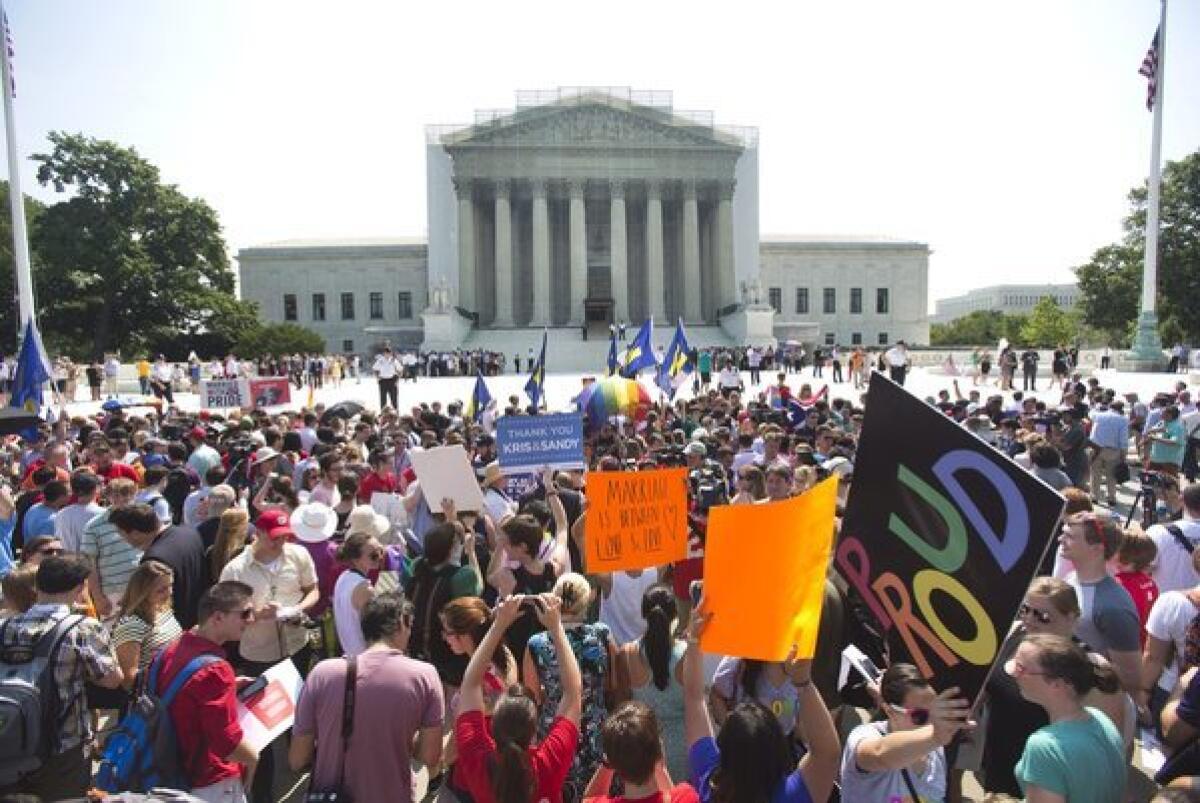Gay marriage rulings: Joy, sadness outside Supreme Court

WASHINGTON -- Shortly after the Supreme Court ruling clearing the way for gay marriage in California, Paul Katami, one of the plaintiffs in the case, proposed to his partner, Jeff Zarillo.
“Today is a good day. It’s the day I finally get to look at the man that I love and finally say ‘will you please marry me,’” he said, before exchanging a kiss in front of scores of television cameras and photographers on the plaza outside the court.
As two key gay-marriage decisions -- the other striking down parts of the federal Defense of Marriage Act -- were handed down Wednesday, hundreds of people in front of the court pulled out their smartphones and tablets, shielding their eyes from the sun to read the rulings.
As people began to read the two decisions, supporters hugged one another and sang the national anthem.
A father of three and employee at the World Bank, Tafadzwa Vargas-Kasambira said the DOMA ruling will allow him to be added to the federal health insurance policy of his husband, Miguel, an employee at the Food and Drug Administration.
Documents: Decisions on DOMA, Prop. 8
“I’ve had to do it myself, which I’ve been happy to,” Tafadzwa said, but the court’s striking down of DOMA shows “our country aligning with international organizations, who have long recognized same-sex couple work benefits.”
Miguel and Tafadzwa met while doing research in South Africa, later marrying in Washington in 2004. They have three children, ages 5, 3 and 1, adopted from Texas.
Standing underneath a lamp post on the other side of the street, a man held a sign reading “Sodomy, AIDS: ‘The wage of sins is death.’”
The rulings were predictable, said Ronald Brock, who left his job in 1989 to travel the country as a self-described Christian missionary preaching against sodomy and abortion.
“I didn’t expect anything different based on everything that’s going on in the nation,” Brock said. “We’ve walked away from God’s moral principles.”
Blair and Brandon Dottin-Haley said the DOMA ruling could be this generation’s Brown vs. Board of Education, which declared racial segregation unconstitutional.
“The federal government says we aren’t three-fifths of human beings anymore,” said Blair. The two were married in Washington, live in Virginia and now plan on filing jointly to the federal government.
“Both as an African American male and a gay married man, I’m happy.”
Full coverage: Prop. 8 and DOMA
Blair, like many, said he expected the Proposition 8 ruling to be vacated. “We got a good deal. ... It’s a great thing and better than no ruling,” he said.
In the shade across the street, Leigh Ann Phillips-Knope played with her 17-month old son, Kai. “See the flags?” she said to Kai, pointing at rainbow flags waving nearby. “It’s a good day, mister.”
Leigh Ann and Kim Phillips-Knope were first legally married in Toronto, where they lived for a year, and then moved to Massachusetts, where they married once more.
“Michigan doesn’t recognize me as a parent to Kai, which puts him at a greater risk,” Kim Phillips-Knope said as she fed Kai juice, “and there are no health benefits for same-sex couples from state-funded agencies.”
“It’s bittersweet, because we go back to Michigan not recognized by the state,” said Leigh Ann, who gave birth to Kai. “But for the moment it looks like the tide has moved in a really strong way, and it’s just a matter of time now.”
[For the Record, 12:39 p.m. PST June 26: An earlier version of this post said Blair and Brandon Dottin-Haley live in Maryland. Actually, they were married in Washington and live in Virginia.]
ALSO:
GRAPHIC: Gay marriage in the U.S.
PHOTOS: Supreme Court rules on Prop. 8 and DOMA
DOCUMENTS: Supreme Court decisions on DOMA, Prop. 8
Follow Politics Now on Twitter and Facebook
More to Read
Sign up for Essential California
The most important California stories and recommendations in your inbox every morning.
You may occasionally receive promotional content from the Los Angeles Times.










